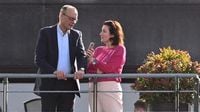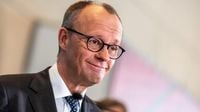On April 28, 2025, Friedrich Merz, the designated Chancellor of Germany, officially announced his cabinet appointments, marking a significant step in the formation of the new black-red government coalition. The lineup showcases a blend of experienced politicians and notable newcomers, reflecting Merz's vision for a robust administration.
The cabinet list, shared on social media, features a diverse array of ministers tasked with steering various key departments. Among the appointments, Thorsten Frei takes the role of Bundesminister für besondere Aufgaben and Chef des Bundeskanzleramtes, while Karin Prien is set to become the Bundesministerin für Bildung, Familie, Senioren, Frauen und Jugend. Katherina Reiche has been appointed as Bundesministerin für Wirtschaft und Energie, and Patrick Schnieder will lead the Bundesministerium für Verkehr.
In a notable development, Johann David Wadephul has been named the new Bundesminister für Auswärtiges, making him the first CDU foreign minister in nearly 60 years. Nina Warken is also a key figure in this cabinet, taking on the responsibilities of Bundesministerin für Gesundheit. Meanwhile, Karsten Wildberger, a prominent figure in the business sector and former CEO of the MediaMarkt/Saturn Group, will become the Bundesminister für Digitales und Staatsmodernisierung.
"This is our team for Germany: the best for our cabinet, the best for our country," Merz stated during the announcement, emphasizing his commitment to assembling a capable and effective government.
Wolfram Weimer has been appointed Staatsminister für Kultur und Medien, while Christiane Schenderlein will serve as Staatsministerin für Sport und Ehrenamt. Michael Meister will oversee Bund-Länder-Zusammenarbeit, and Serap Güler and Gunther Krichbaum will both serve as Staatsminister im Bundesministerium des Auswärtigen.
Wildberger's appointment as Digital Minister has raised eyebrows, as he is expected to bring extensive experience from the private sector into the public realm. He expressed his gratitude for the trust placed in him by Merz, stating, "I feel honored by the confidence that Friedrich Merz places in me and the opportunity to become the new Minister for Digital Affairs." Following the announcement, Wildberger requested to be relieved of his duties at Ceconomy by May 5, 2025, just ahead of Merz's expected election as Chancellor on May 6, 2025.
As the CDU prepares for its small party congress to finalize the coalition agreement, the anticipation surrounding the cabinet's formation is palpable. This congress, attended by 160 delegates, will also see discussions on key policy directions for the new government. The coalition agreement is a critical document that outlines the priorities and commitments of the CDU and its coalition partners, the SPD and CSU.
In parallel, the CSU, led by Markus Söder, is set to unveil its ministerial appointments, with Alexander Dobrindt expected to take on the role of Bundesinnenminister. Daniela Ludwig is anticipated to serve as Innenstaatssekretärin. The CSU will also oversee the Landwirtschaftsministerium, with Alois Rainer emerging as a potential candidate for this position, replacing the previously favored Michaela Kaniber.
As the political landscape shifts, the new government will face a range of challenges, including economic recovery post-pandemic, digital transformation, and social issues. Each minister's expertise will be crucial in navigating these complex matters.
In summary, the newly announced cabinet reflects a strategic blend of continuity and innovation, with Merz aiming to balance experienced politicians with fresh perspectives. The upcoming weeks will be pivotal for the coalition as they finalize their agreements and prepare for the Chancellor's election.
As the CDU and CSU finalize their cabinet, all eyes will be on the SPD, which has yet to announce its ministerial candidates. The SPD will reveal its selections following the results of a member vote on the coalition agreement, expected to conclude shortly.
Ultimately, the success of Merz's government will hinge on the collaboration among these ministers and their ability to address the pressing issues facing Germany today. The coalition's commitment to working together will be tested as they embark on this new political journey.
The formation of this cabinet marks a significant moment in German politics, as it not only reshapes the government but also sets the tone for future policies and governance strategies.






